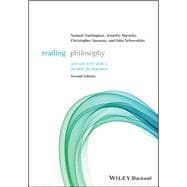A key introductory philosophy textbook, making use of an innovative, interactive technique for reading philosophical texts
Reading Philosophy: Selected Texts with a Method for Beginners, Second Edition, provides a unique approach to reading philosophy, requiring students to engage with material as they read. It contains carefully selected texts, commentaries on those texts, and questions for the reader to think about as they read. It serves as starting points for both classroom discussion and independent study. The texts cover a wide range of topics drawn from diverse areas of philosophical investigation, ranging over ethics, metaphysics, epistemology, philosophy of mind, aesthetics, and political philosophy.
This edition has been updated and expanded. New chapters discuss the moral significance of friendship and love, the subjective nature of consciousness and the ways that science might explore conscious experience. And there are new texts and commentary in chapters on doubt, self and moral dilemmas.
- Guides readers through the experience of active, engaged philosophical reading
- Presents significant texts, contextualized for newcomers to philosophy
- Includes writings by philosophers from antiquity to the late 20th-century
- Contains commentary that provides the context and background necessary for discussion and argument
- Prompts readers to think through specific questions and to reach their own conclusions
This book is an ideal resource for beginning students in philosophy, as well as for anyone wishing to engage with the subject on their own.








